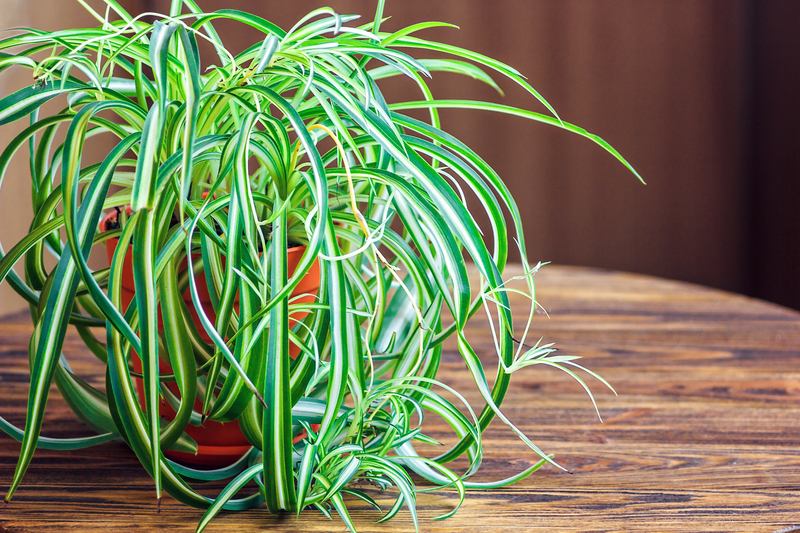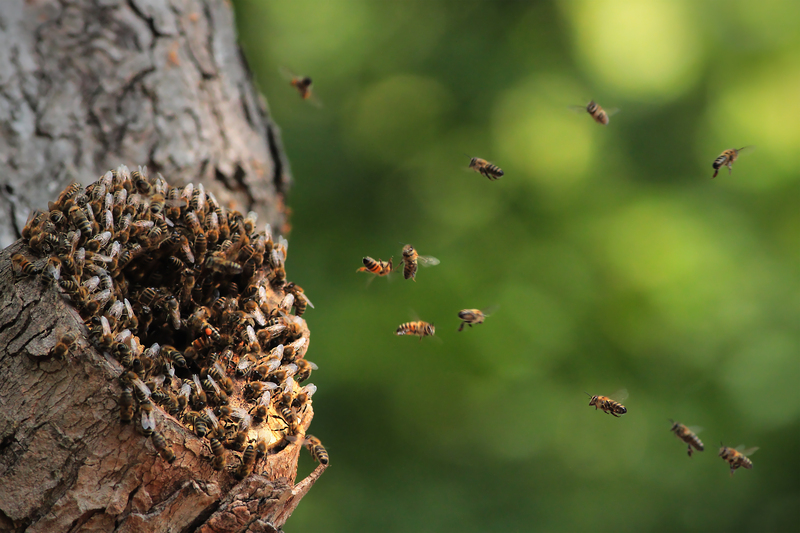Unlock the Potential of Your Garden with Weed Control
Posted on 31/08/2025
Unlock the Potential of Your Garden with Weed Control
Are you striving for a lush, vibrant, and thriving garden? If so, mastering effective weed control is the crucial step to unlocking your garden's ultimate potential. Weeds not only detract from your garden's beauty but also compete for valuable resources, hampering the growth and vitality of your beloved plants. This comprehensive guide explores a variety of techniques, solutions, and strategies for weed control in your garden, helping you nurture a landscape that flourishes all season long.
Why Is Weed Control Essential for Your Garden?
Weeds are opportunistic plants that can quickly take over your garden if left unchecked. Effective weed management is about more than aesthetics; it's about ensuring that your chosen plants thrive without competition for nutrients, sunlight, and water.
- Enhanced Plant Health: Weeds compete for nutrients and moisture, often dwarfing or even killing ornamental or edible plants.
- Prevents the Spread of Diseases: Many weeds are carriers of pests and diseases, putting your entire garden at risk.
- Improved Gardening Experience: A weed-free garden is easier to maintain, more productive, and visually stunning.
- Boosts Your Garden's Yield: Whether you grow flowers or vegetables, proper weed control maximizes growth and output.

Understanding Common Weeds and Their Behaviors
Before launching your weed management strategy, it's vital to identify the types of weeds invading your space. Weeds are generally categorized into three groups:
- Annual Weeds: Complete their lifecycle in one year (e.g., chickweed, crabgrass).
- Biennial Weeds: Take two years to mature (e.g., wild carrot, bull thistle).
- Perennial Weeds: Return year after year (e.g., dandelion, bindweed).
Proper identification helps you select the most effective weed control methods for your garden.
Key Principles for Successful Weed Control in Your Garden
Unlocking your garden's potential with weed control begins with a few foundational principles:
- Prevention is better than cure.
- Consistency ensures lasting results.
- Integrated strategies create the best outcomes.
Let's dive into the effective techniques that will help you achieve superior weed regulation in your garden.
The Best Methods for Weed Control in Your Garden
1. Manual and Mechanical Weed Removal
- Hand Pulling: Especially effective for small areas and young weeds. Use gloves and pull from the base to remove the root system.
- Hoeing: Use a sharp hoe to cut weeds at the soil line. This is especially useful for annual weeds.
- Tilling: For large areas, tilling or turning the soil can uproot and destroy weed seedlings.
2. Mulching: A Garden's Secret Weapon
Mulching is one of the most powerful methods for suppressing weed growth. By creating a physical barrier, mulch deprives weeds of light and curtails seed germination.
- Organic Mulches: Straw, wood chips, bark, leaves, or compost improve soil structure and fertility while blocking weeds.
- Inorganic Mulches: Landscape fabric, black plastic, or gravel.
Tip: Apply a 2-4 inch layer of mulch around your plants, being careful not to smother their roots. Mulch also aids in moisture retention--an added bonus!
3. Smothering and Solarization
For areas heavily infested with weeds, try smothering them using cardboard, newspaper, or plastic sheeting. This method blocks sunlight, effectively killing existing weeds and preventing new ones from emerging.
- Solarization: During hot months, cover the soil with clear plastic. The sun's rays heat the soil, destroying weed seeds and pathogens.
4. Correct Plant Spacing and Dense Planting
Densely planted garden beds leave little room for weeds to take hold. Thoughtful arrangement of your plants means their roots, leaves, and stems outcompete weeds for resources, reducing vacant space for unwanted growth.
5. Watering Techniques to Discourage Weeds
Targeted watering helps your desired plants grow while denying weeds the moisture they crave.
- Drip Irrigation and Soaker Hoses: Direct water right to plant roots, minimizing moisture available to weed seeds.
- Avoid Overhead Watering: This technique often encourages weeds between your rows and beds.
6. Chemical Weed Control Solutions: Use Sparingly
While there are herbicides designed for garden use, their application should be a last resort and used judiciously:
- Always select a selective herbicide if possible to target specific weeds.
- Follow manufacturer guidelines to prevent harm to desired plants or the environment.
- Consider spot-treating individual weeds instead of blanket spraying your garden.
Note: Always weigh the benefits and drawbacks of chemical weed management, especially in vegetable or pollinator gardens.
7. Organic and Eco-Friendly Weed Management
- Vinegar or Salt Sprays: Effective on patios and driveways but use with caution around plants.
- Corn Gluten Meal: Works as a pre-emergent, preventing weed seeds from germinating in your lawn or garden beds.
- Boiling Water: Pour directly onto the weeds for an eco-safe kill.
Proactive Garden Care to Minimize Future Weed Problems
Preventive gardening is the most powerful weapon against persistent weeds. Here's how you can maintain a garden that stays beautiful and nearly weed-free:
- Regular Inspections: Walk your garden weekly and pull out emerging weeds before they set seed.
- Healthy Soil, Healthy Plants: Well-nourished plants grow vigorously and naturally outcompete most weeds.
- Compost Carefully: Ensure your compost heap reaches high enough temperatures to destroy weed seeds. Avoid adding seed-laden weeds to your compost pile.
- Edge Your Beds: Lawn edging keeps aggressive turf weeds from infiltrating your garden spaces.
Weed Control for Different Types of Gardens
Different garden types require tailored weed control strategies for optimal success:
Flower Gardens
Use mulching and manual weeding to preserve delicate flowers. Avoid broad-spectrum herbicides that can damage ornamentals.
Vegetable Gardens
Prioritize organic weed control methods. Crop rotation also helps reduce the buildup of persistent weed species and soil-borne diseases.
Herb Gardens
Dense planting and regular trimming of herbs minimize weed competition. Most herbs thrive with minimal invasion if kept well-tended.
Lawns
Pre-emergent herbicides in early spring, proper fertilizing, and mowing high are essential for a weed-resistant lawn.
Container Gardens
Less prone to weeds, but occasional hand-pulling and replacing contaminated soil will keep your potted plants weed-free.
Common Myths About Weed Control
- "All weeds are bad." - While most are unwanted, some weeds fix nitrogen or support biodiversity.
- "One treatment is enough." - Ongoing vigilance and repeated efforts yield the best results.
- "Herbicides are the only solution." - Multiple natural and cultural methods can be just as effective.
- "Mulching guarantees no weeds." - Mulch is preventative, but persistent or windblown seeds can still sprout.
Integrating Weed Control into Your Overall Garden Maintenance
Unlocking your garden's potential is about more than just eradicating weeds--it's about cultivating a healthy ecosystem. Combining weed control with smart gardening practices enhances the beauty, productivity, and sustainability of your outdoor space.
- Companion Planting: Choose plants that naturally crowd out or inhibit weeds.
- Cover Crops: Planting fast-growing species during the off-season prevents weeds from gaining a foothold.
- Healthy Borders: Dense, healthy borders act as natural weed barriers.
The Environmental Benefits of Thoughtful Weed Control
Practicing responsible weed control not only improves your garden but also benefits the broader environment. By minimizing chemical use and encouraging biodiversity, you protect pollinators, soil health, and local wildlife.
- Encourage beneficial insects and pollinators by creating a balanced, low-weed environment.
- Protect water quality by reducing runoff from chemical weed killers.
- Conserve soil through smart weed management and ground covers.
Choosing the Right Weed Control Products and Tools
The key to successful weed control in your garden lies in choosing the proper tools for your situation. Consider these garden essentials:
- Hand Trowel and Weeder: Best for precise removal of individual weeds.
- Garden Hoe: For larger beds and fast weeding.
- Landscape Fabric: Excellent for beds with perennials and shrubs.
- Organic Mulch: Choose bark, straw, or leaf mulch for annual and vegetable beds.
- Pre-emergent Herbicide: Use with caution in lawns and flower beds.

Seasonal Weed Control Tips
Spring
- Mulch garden beds early to preempt weed emergence.
- Apply pre-emergent herbicide in lawns before crabgrass germinates.
Summer
- Monitor problem areas after heavy rains or irrigation.
- Continue hand weeding and spot treatments as needed.
Autumn
- Remove mature weeds before they drop seeds.
- Top up mulch and plant cover crops to prevent erosion and winter weed growth.
Winter
- Inspect garden regularly for overwintering weeds in mild climates.
- Plan your weed control strategy for the next growing season.
Conclusion: Unlock Your Garden's Full Potential With Smart Weed Management
Unlocking the true beauty and productivity of your garden begins with effective weed control. By implementing best practices such as mulching, manual removal, correct plantings, and eco-friendly approaches, you can create a thriving space where desired plants flourish and weeds are kept in check. Consistent, thoughtful weed management not only improves your garden's appearance but also fosters healthier plants, higher yields, and an overall better gardening experience. Remember, a weed-free garden is the foundation of a landscape that reaches its fullest potential--so start your weed control plan today and watch your garden flourish like never before!
Latest Posts
Privacy Upgrade: Explore 9 Fast-Growing Hedge Options
Discovering Joy in a Kid-Friendly Garden Design
Winter Fortress: Ensuring Garden Plant Health



